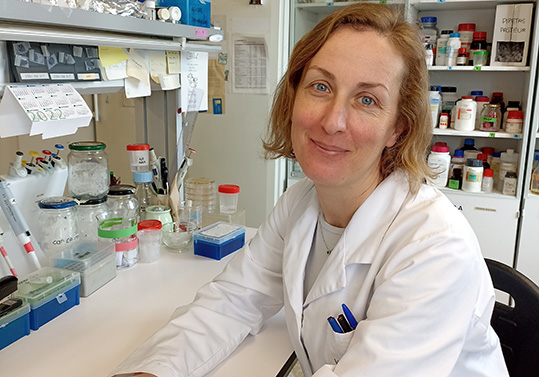BIOTECMED research receives one million euros from Human Frontier to investigate how viruses manipulate the sense of smell
- Press Office
- March 22nd, 2022

The researcher Cristina Crava from the Institute of Biotechnology and Biomedicine (BIOTECMED) of the Universitat de València leads a research project that has just received funding from the Human Frontier Science Program (HFSP) to investigate how a virus manipulates the sense of smell of its hosts.
Viruses can manipulate the behaviour of their hosts to maximise their dispersal. They do this by altering different cellular mechanisms, among which olfaction may be a primary target. The intercontinental and interdisciplinary team formed by Universitat de Valencia researcher Cristina Crava and collaborators Jordi Felip Gamir (Universitat Jaume I, Castellón), Lucia Prieto Godino (Francis Crick institute, UK) and Felipe Yon (Universidad Cayetano Heredia, Peru) will receive funding of around 1 million euros to investigate how a virus normally used to control insect pests manipulates the sense of smell of the caterpillars it infects, and how these change their interaction with their host plant.
"We want to expand our knowledge of the molecular and cellular basis used by the virus to manipulate the behaviour of infected caterpillars," explains Cristina Crava, researcher at BIOTECMED. "It is currently known that the virus we use, baculovirus, modifies the behaviour of larvae, for example by causing them to climb to the top of plants where they are less protected from predator attacks. How the virus does this, however, is not known. Smell is a basic sense for insects, which they use to identify the presence of food, enemies and potential mates. We hypothesise that it may be an ideal target for the virus. If you alter how caterpillars perceive their external world, you can manipulate their behaviour”. The research team will use a range of techniques from neurophysiology and bioinformatics to ecology, immunology and genetics.
The Human Frontier Science Program (HFSP) is an international research support programme funded by the Human Frontier Science Program Organization (HFSPO), based in Strasbourg. Its aim is to promote international and interdisciplinary collaborations investigating pioneering topics in life sciences. To obtain this prestigious funding, the team had to go through a rigorous selection process that began a year ago, in which they had to compete with more than 700 proposals from researchers from all over the world. Of these, only 28 have been funded by the HFSPO. In detail, the team led by Dr. Cristina Crava will receive 430.000 dollars a year for three years.
More information:
















